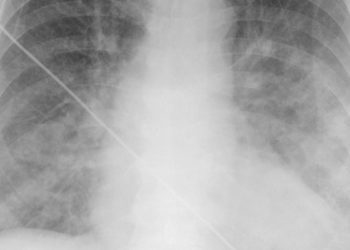The CONSENSUS: Enalapril reduces mortality in severe heart failure [Classics Series]
1. In patients with severe heart failure, treatment with enalapril significantly reduced the risk of mortality at 6-months and 1-year when compared with placebo.
2. The reduction in mortality was due to significantly lower risk of mortality resulting from progression of heart failure.
3. Patients on enalapril were significantly more likely to suffer from hypotension compared to those receiving placebo.
Original Date of Publication: June 1987
Study Rundown: In 1987, few therapies for heart failure were supported by well-conducted randomized trials. Most patients were treated with digoxin and diuretics for symptomatic relief. The V-HeFT I, originally published in 1986, was one of the first studies to demonstrate mortality benefit in the treatment of heart failure, as patients receiving the combination of hydralazine and isosorbide dinitrate had significantly lower mortality than patients on placebos. It was suspected that hydralazine and isosorbide improved outcomes by optimizing cardiac hemodynamics in reducing both preload and afterload. At the time of the Cooperative North Scandinavian Enalapril Survival Study (CONSENSUS), some evidence existed suggesting that angiotensin-converting-enzyme (ACE) inhibitors had beneficial effects on cardiac hemodynamics and heart failure symptoms. As a result, the CONSENSUS was conducted to determine the effects of enalapril on mortality in severe heart failure. In summary, patients being treated with enalapril experienced significantly lower mortality at both 6-months and 1-year when compared to those on placebo. This was driven by a significant reduction in mortality due to heart failure progression. Of note, the trial was terminated early by the Ethical Review Committee on the basis of ethical considerations given the large reduction in mortality observed in the enalapril group.
Click to read the study in NEJM
In-Depth [randomized controlled trial]: The CONSENSUS was a randomized trial conducted at 35 centers in North Scandinavia (6 centers in Finland, 12 in Norway, 17 in Sweden). Patients were eligible for the trial if they had severe congestive heart failure, that is New York Heart Association (NYHA) class IV symptoms, with radiographically determined enlarged heart size (i.e., >600 mL/m2 body surface area in men, >550 mL/m2 in women). All patients were on treatment with digoxin and diuretics. Exclusion criteria included acute pulmonary edema, hemodynamically significant aortic or mitral valve stenosis, myocardial infarction within the previous two months, unstable angina, planned cardiac surgery, right heart failure secondary to pulmonary disease, and serum creatinine concentration >300 μmol/L. Patients were randomized to treatment with enalapril (i.e., starting at 5 mg twice daily, titrated up to 20 mg twice daily) or placebo. The primary endpoints were 6-month mortality and cause of death.
The study was terminated early by the Ethical Review Committee after a total of 253 patients had undergone randomization. Patients in the enalapril group experienced significantly lower 6-month mortality compared to patients receiving placebo (26% vs. 44%, RRR 40%, p < 0.002). Mortality at 1-year was also significantly lower in patients being treated with enalapril (36% vs. 52%, RRR 31%, p < 0.001). There were no significant differences between the two groups in the rates of sudden cardiac death (p > 0.25), though patients being treated with enalapril were significantly less likely to die from heart failure progression compared to those on placebo (22 vs. 44, p < 0.001). Similar numbers of patients from both groups withdrew from the study (14% in the placebo group, 17% in the enalapril group), though more patients withdrew from the enalapril group due to hypotension compared to those on placebo (7 on enalapril, 0 on placebo).
Image: PD
©2015 2 Minute Medicine, Inc. All rights reserved. No works may be reproduced without expressed written consent from 2 Minute Medicine, Inc. Inquire about licensing here. No article should be construed as medical advice and is not intended as such by the authors or by 2 Minute Medicine, Inc.







